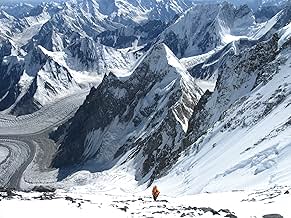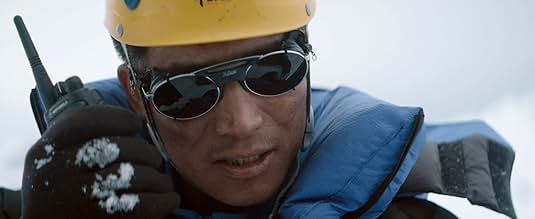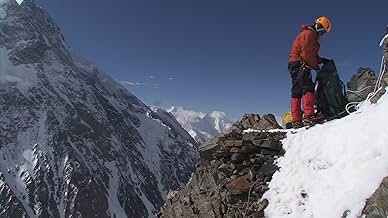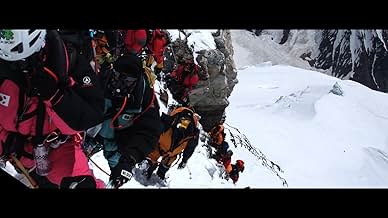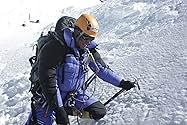IMDb-BEWERTUNG
6,8/10
5639
IHRE BEWERTUNG
Die Geschichte des tödlichsten Tages auf dem gefährlichsten Berg der Welt, als elf Kletterer auf mysteriöse Weise auf dem K11 ums Leben kamen.Die Geschichte des tödlichsten Tages auf dem gefährlichsten Berg der Welt, als elf Kletterer auf mysteriöse Weise auf dem K11 ums Leben kamen.Die Geschichte des tödlichsten Tages auf dem gefährlichsten Berg der Welt, als elf Kletterer auf mysteriöse Weise auf dem K11 ums Leben kamen.
- Auszeichnungen
- 3 Gewinne & 5 Nominierungen insgesamt
Walter Bonatti
- Self
- (Archivfilmmaterial)
Gerard McDonnell
- Self - Climber
- (Archivfilmmaterial)
Hristo Mitzkov
- Marco Confortola
- (as Christo Mitzkov)
Lochlann O'Mearáin
- Ger McDonnell
- (as Lochlainn O'Mearain)
Empfohlene Bewertungen
From what I understood, this documentary set out to answer a difficult moral dilemma: should a climber endanger his own life in order to save others'? I think it did a beautiful job at giving a rather complete picture of people's different perspectives, attitudes, projected against the outcome. It is probably one of the best documentaries that I have seen, in the sense that it manages to capture the gist of this issue.
On a more personal note, I really liked the comment that the widow of one of the perished climbers makes towards the end of the movie. It raises an interesting question "of judgment" for the people that are outside the climbing world.
On a more personal note, I really liked the comment that the widow of one of the perished climbers makes towards the end of the movie. It raises an interesting question "of judgment" for the people that are outside the climbing world.
The visuals are for the most part great, sometimes blurring the line between archival documentary footage and re-enactment.
But the movie itself is poorly structured.
For seemingly no reason at all it jumps back and forth in time, making one unsure exactly what happened when, and how much time has passed. I imagine a more linear approach would have been much more effective.
There was a bunch of climbers divided into three groups, but the movie doesn't do a very good job of introducing them, with a few exceptions, making them indistinguishable from one another. Consequently it's sometimes hard to understand who is where on the mountain and when, exacerbating the problems of the non-linear narrative.
It's a pity. This movie could've been great, especially with the documentary footage, but it's lacking in focus.
But the movie itself is poorly structured.
For seemingly no reason at all it jumps back and forth in time, making one unsure exactly what happened when, and how much time has passed. I imagine a more linear approach would have been much more effective.
There was a bunch of climbers divided into three groups, but the movie doesn't do a very good job of introducing them, with a few exceptions, making them indistinguishable from one another. Consequently it's sometimes hard to understand who is where on the mountain and when, exacerbating the problems of the non-linear narrative.
It's a pity. This movie could've been great, especially with the documentary footage, but it's lacking in focus.
High-altitude mountaineering fascinates many people, this reviewer included, for the extreme demands it places on sportsmen engaged on the sport. They go to places where helicopters don't go, where no human could live for extended periods of time. Different than other extreme nature sports like rafting, cross-country skiing or long-distance trekking, mountaineering provides the only way for people to reach places that are higher above the rest of the World.
In this context, I generally like documentaries and docudramas that focus on various aspects of the sport, its challenges and also its tragedies.
However, The Summit covers a nice story on a confusing and haphazard edition. It combines real-time footage of events, 'debriefing'-style post-fact interviews and dramatization of events are accounted by those that survived or witnessed them first-hand. All that material should yield a great final piece, but I'm left with the feeling of watching an unfinished job, or a piece that was somehow the result of compromises of an intractable committee with diverging opinions on how the documentary should look like.
In this context, I generally like documentaries and docudramas that focus on various aspects of the sport, its challenges and also its tragedies.
However, The Summit covers a nice story on a confusing and haphazard edition. It combines real-time footage of events, 'debriefing'-style post-fact interviews and dramatization of events are accounted by those that survived or witnessed them first-hand. All that material should yield a great final piece, but I'm left with the feeling of watching an unfinished job, or a piece that was somehow the result of compromises of an intractable committee with diverging opinions on how the documentary should look like.
"He discovers things about his own body and mind that he had almost forgotten in the day-to-day, year-to-year routine of living." James Ramsey Ullman, High Conquest.
I don't know about you, but if I were approaching the "death zone" while mountain climbing, I'd turn back. However, you can bet the heroes of the documentary, The Summit, hiking the world's second biggest and most difficult mountain (it defeats 1 out of every 4 climbers), K2, had no such thoughts. The Summit won the Sundance World Cinema documentary award this year.
More interesting than the physical exploits is the rationale for doing such a dangerous sport in the first place. Yet, such psychoanalyzing is not a matter for The Summit, a thrilling doc long on the difficult climb and more difficult decisions while fates are decided in sometimes inscrutable and random ways. It's short on the motivation, which pretty much is accepted these days as, "because it's there."
Eleven climbers of 25 lost their lives that day in 2008 without an adequate explanation for any of the deaths. However this thesis is proved once more: Most lives in climbing are lost on the descent. The film has a fragmented, multiple-points-of-view (think of a climbing Rashomon) approach that cuts among the several players and history while featuring a couple of the more charismatic climbers, especially Ger McDonnell, whose death is the most difficult to understand even as he's touted for his alleged attempt to save 3 Korean climbers.
This discursive storytelling can be confusing while it saps the thrust of the inherently intriguing story. The many re-enactments drain the film of its immediate "what-the" doc impact. The film retains some of the awe we all feel when in the presence of such a manifestation of Nature's power:
"You do not laugh when you look at the mountains, or when you look at the sea." Lafcadio Hearn
I don't know about you, but if I were approaching the "death zone" while mountain climbing, I'd turn back. However, you can bet the heroes of the documentary, The Summit, hiking the world's second biggest and most difficult mountain (it defeats 1 out of every 4 climbers), K2, had no such thoughts. The Summit won the Sundance World Cinema documentary award this year.
More interesting than the physical exploits is the rationale for doing such a dangerous sport in the first place. Yet, such psychoanalyzing is not a matter for The Summit, a thrilling doc long on the difficult climb and more difficult decisions while fates are decided in sometimes inscrutable and random ways. It's short on the motivation, which pretty much is accepted these days as, "because it's there."
Eleven climbers of 25 lost their lives that day in 2008 without an adequate explanation for any of the deaths. However this thesis is proved once more: Most lives in climbing are lost on the descent. The film has a fragmented, multiple-points-of-view (think of a climbing Rashomon) approach that cuts among the several players and history while featuring a couple of the more charismatic climbers, especially Ger McDonnell, whose death is the most difficult to understand even as he's touted for his alleged attempt to save 3 Korean climbers.
This discursive storytelling can be confusing while it saps the thrust of the inherently intriguing story. The many re-enactments drain the film of its immediate "what-the" doc impact. The film retains some of the awe we all feel when in the presence of such a manifestation of Nature's power:
"You do not laugh when you look at the mountains, or when you look at the sea." Lafcadio Hearn
This is a story about tragedy caused by complete and utter confusion. From simple mistakes at the beginning of the attempt everything turned into chaos that cost many lives.
So, given that confusion in the subject matter, it would be difficult to remove confusion from the documentary. Sadly, the creators seem to have actually gone out of their way to introduce more confusion. Out of sequence histories, introducing another (related) story, and not attempting to tie everything together.
I'm glad that I watched this movie, I just would have liked it to be better put together.
So, given that confusion in the subject matter, it would be difficult to remove confusion from the documentary. Sadly, the creators seem to have actually gone out of their way to introduce more confusion. Out of sequence histories, introducing another (related) story, and not attempting to tie everything together.
I'm glad that I watched this movie, I just would have liked it to be better put together.
Wusstest du schon
- WissenswertesWon Best Feature film at 2013 BANFF film festival. The award was accepted on behalf of the film makers by Norwegian adventurer Cecilie Skog, who is featured in the film.
- Crazy CreditsThe title of the movie does not show until about 15 minutes into the film.
- VerbindungenReferenced in Film Junk Podcast: Episode 457: Nymphomaniac Vol. 1 and True Detective (2014)
Top-Auswahl
Melde dich zum Bewerten an und greife auf die Watchlist für personalisierte Empfehlungen zu.
- How long is The Summit?Powered by Alexa
Details
- Erscheinungsdatum
- Herkunftsländer
- Offizielle Standorte
- Sprachen
- Auch bekannt als
- The Summit
- Drehorte
- K2, Karakoram Mountain Range, Pakistan(Aerial Sequences)
- Produktionsfirmen
- Weitere beteiligte Unternehmen bei IMDbPro anzeigen
Box Office
- Budget
- 1.000.000 $ (geschätzt)
- Bruttoertrag in den USA und Kanada
- 243.550 $
- Eröffnungswochenende in den USA und in Kanada
- 20.904 $
- 6. Okt. 2013
- Weltweiter Bruttoertrag
- 277.651 $
- Laufzeit
- 1 Std. 35 Min.(95 min)
- Farbe
- Seitenverhältnis
- 1.85 : 1
Zu dieser Seite beitragen
Bearbeitung vorschlagen oder fehlenden Inhalt hinzufügen


